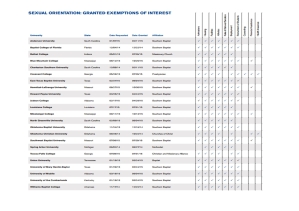Nearly three dozen religious colleges and universities in 20 states received federal waivers that allow those institutions to not accommodate transgender students in admissions, housing, and campus life, according to a report LGBT rights group obtained by Associated Press.
Higher education institutions that receive federal funds for research or financial aid have been barred from discriminating on the basis of sex since the 1970s. Colleges governed by religious organizations are allowed to seek exemptions if they can show treating all students equally would be inconsistent with their religious tenets, reports St. Louis Post-Dispatch.
The church-affiliated schools that in 2014 and 2015 obtained exemptions to a law that prohibits sex discrimination in educational settings collectively enroll more than 73,000 students, the Human Rights Campaign said in a report published Friday and reported by Fox News.
"What we want students to know is schools are serious about this, that they have gone out of their way to make sure they have the legal ability to discriminate against LGBT students," said Sarah Warbelow, the campaign's legal director.
The report, titled Hidden Discrimination: Title IX Religious Exemptions Putting LGBT Students at Risk, spotlights 56 colleges and universities based in 26 states that have requested religious exemptions under Title IX since 2013. The situation collectively represents nearly 120,000 students.
Of the 23 institutions listed in this report that were granted exemptions based on sexual orientation, 17 of them, or 74 percent, were affiliated with the Southern Baptist denomination.

Although Title IX is most recognized for its impact on women's athletic programs, it protects students from sex discrimination in a broad array of areas at colleges and universities, including admissions, housing, recruitment, athletics, facilities, financial assistance and counseling services. With a growing recognition that Title IX safeguards students on the basis of gender identity and sexual orientation - including recent case law, Department of Education guidance, and school district settlements that support the use of it by LGBT students seeking legal recourse - Human Rights Campaign staffers say the law serves as a vital tool to combat the "discrimination and harassment that LGBT students face.
These "right-to-discriminate" waivers were relatively rare until the last year, according to The Column. A handful were requested in the 1980s and 1990s.
Application of Title IX changed in 2014, according to The Column, when the Obama administration issued guidance that the Title IX discrimination prohibition "extends to claims of discrimination based on gender identity or failure to conform to stereotypical notions of masculinity or femininity," meaning that entities receiving federal funding could not discriminate against transgender and gender nonconforming people.
In response to that guidance and several lawsuits, The Column points out that conservative Christian leaders began positioning schools to expel transgender students.
Eighteen of the 34 universities and colleges representatives who told the U.S. Department of Education that giving transgender students access to single-sex restrooms and facilities that correspond with their gender identity would be inconsistent with their religious tenets are controlled by the Southern Baptist Convention, according to public records obtained by both the Human Rights Campaign and the AP.
Alliance Defending Freedom senior counsel Gregory Baylor said the Department of Education received a spike in waiver applications because its Office for Civil Rights has "exceeded its legal authority" by taking the position since 2013 that the federal law that prohibits sex discrimination applies to transgender students.







